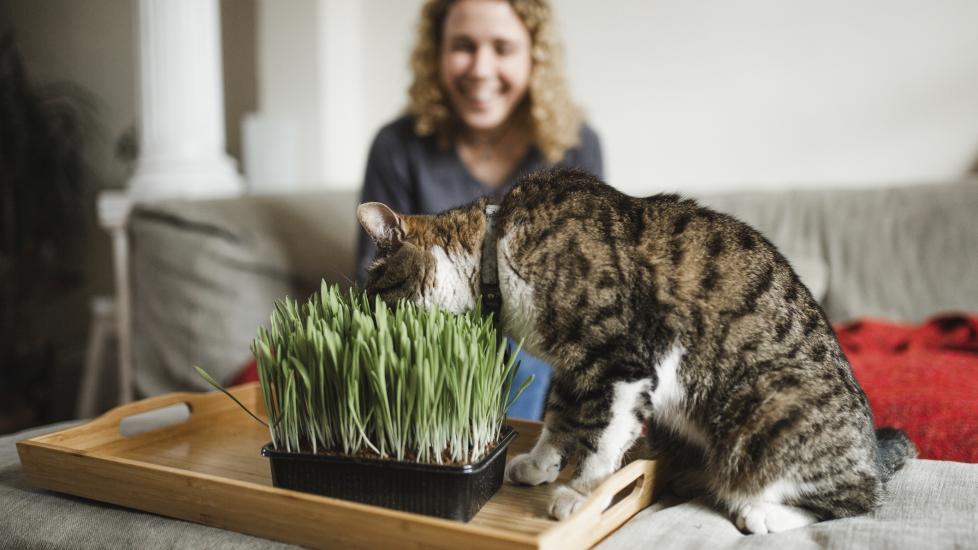Why Do Cats Eat Grass?
It’s a common misconception that cats eat grass only when they feel ill or nauseous. Cats are carnivores and cannot digest fibrous grass like cows and horses can, so it does frequently end up in their vomit and stool.
But eating grass is actually a very common behavior in cats—even in those who aren’t sick. So don’t assume your cat is under the weather if they seek out some grass to chew on.
But why do cats eat grass? There are limited studies to tell us exactly why cats engage in this behavior, but here are some science-based theories held by veterinary professionals as to why cats eat grass.
Why Is My Cat Eating Grass?
If your cat is eating grass, here are some theories as to what could be going on.
Purging Hairballs
Because cats frequently vomit after eating grass, some scientists theorize that domestic cat ancestors would eat grass to relieve other non-digestible materials from the stomach. For example, cats who hunted small prey may have wanted to help get rid of feathers and small bones that don’t digest quickly.
Modern cats may use this method to help expel hairballs, but a 2021 study did not find a difference in grass-eating tendencies between long-haired (aka hairball-prone) cats and short-haired cats.
Easing Constipation
Grass that isn’t vomited frequently ends up in the stool, unchanged. This may help increase movement in the colon for mildly constipated cats. Higher-fiber diets are recommended for cats that frequently have issues passing stool. Ask your vet if you are concerned about your cat having regular bowel movements.
Parasite Prevention
It’s suspected in multiple wild species of animals that grass and plant fibers are intentionally eaten to help reduce intestinal parasites. Adult worms have been found in the stool of wolves and civets wrapped in plant materials.
Though there is no indication that domestic cats purposefully eat grass to this effect, it’s a very likely reason why, evolutionarily, the species has held onto this trait.
Vitamin and Mineral Supplementation
Though grass is not readily digested, some low-level mineral or vitamin deficiencies may be addressed by eating it. Studies have not been performed to suggest exactly what can be absorbed from grass by cats, but it’s important to make sure your cat is on a well-balanced commercial pet food to avoid any possible vitamin deficiencies.
Grass Tastes Good
Some cats just genuinely seem to enjoy grass and leafy greens. Cats have unique personalities and tastes, and some may just decide that grass is fun to eat!
Should I Be Concerned About My Cat Eating Grass?
While grass-eating is a very common behavior in cats, it isn’t always normal. If you notice that your cat frequently eats and then vomits grass, it may be an indication of a gastrointestinal disease, such as inflammatory bowel disease or even parasites.
Talk to your vet about ruling out these conditions with fecal tests, blood tests, and even an abdominal ultrasound, especially if the behavior is new or becoming more frequent.
Is Grass Safe for Cats?
As long as the grass isn’t treated with pesticides or fertilizers, it should be safe for your cat.
But make sure your cat exercises some restraint with this behavior. Eating large amounts or very long pieces of grass could lead to an intestinal blockage, as the fibers are difficult to digest. Some cats may need to be supervised while eating grass to make sure they don’t also ingest soil or other potting materials.
Should I Give My Cat Grass To Eat?
Feeding grass to cats is not a medical necessity, as the evolutionary nutritional and anti-parasitic benefit of it is no longer needed with modern diets and parasite prevention. Though some cats with intestinal issues may be more likely to eat grass, it’s not a standard therapy for these diseases.
Studies do suggest that eating grass seems to be a natural behavior, though modern pet cats do not need grass as a supplement. Indoor cats may sometimes feel the need to chew on houseplants to satisfy their evolutionary craving, which can lead to real problems if the plants are toxic.
You can buy special grass for cats to eat—non-toxic wheat or oat grass seeds, like The Cat Ladies™ Organic Pet Grass growing kit, are readily available to grow. These offer your indoor kitty a safer alternative if they seem to enjoy eating grass, keeping both your cat (and your houseplants!) safer.
Be cautious with the treatments you use on your lawn if your cat goes outside, just in case they take a nibble when you are not watching. And remember: If you’re concerned about your cat eating grass, talk to your vet.
Featured Image: Linda Raymond/E+ via Getty Images
